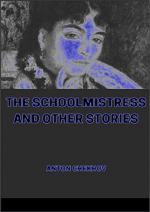“It’s cold,” said one ferryman huskily as he stretched himself on the straw with which the damp clay floor was covered.
“Yes, its not warm,” another assented. “It’s a dog’s life....”
They all lay down. The door was thrown open by the wind and the snow drifted into the hut; nobody felt inclined to get up and shut the door: they were cold, and it was too much trouble.
“I am all right,” said Semyon as he began to doze. “I wouldn’t wish anyone a better life.”
“You are a tough one, we all know. Even the devils won’t take you!”
Sounds like a dog’s howling came from outside.
“What’s that? Who’s there?”
“It’s the Tatar crying.”
“I say.... He’s a queer one!”
“He’ll get u-used to it!” said Semyon, and at once fell asleep.
The others were soon asleep too. The door remained unclosed.
THE CATTLE-DEALERS
The long goods train has been standing for hours in the little station. The engine is as silent as though its fire had gone out; there is not a soul near the train or in the station yard.
A pale streak of light comes from one of the vans and glides over the rails of a siding. In that van two men are sitting on an outspread cape: one is an old man with a big gray beard, wearing a sheepskin coat and a high lambskin hat, somewhat like a busby; the other a beardless youth in a threadbare cloth reefer jacket and muddy high boots. They are the owners of the goods. The old man sits, his legs stretched out before him, musing in silence; the young man half reclines and softly strums on a cheap accordion. A lantern with a tallow candle in it is hanging on the wall near them.
The van is quite full. If one glances in through the dim light of the lantern, for the first moment the eyes receive an impression of something shapeless, monstrous, and unmistakably alive, something very much like gigantic crabs which move their claws and feelers, crowd together, and noiselessly climb up the walls to the ceiling; but if one looks more closely, horns and their shadows, long lean backs, dirty hides, tails, eyes begin to stand out in the dusk. They are cattle and their shadows. There are eight of them in the van. Some turn round and stare at the men and swing their tails. Others try to stand or lie down more comfortably. They are crowded. If one lies down the others must stand and huddle closer. No manger, no halter, no litter, not a wisp of hay....*
At last the old man pulls out of his pocket a silver watch and looks at the time: a quarter past two.
“We have been here nearly two hours,” he says, yawning. “Better go and stir them up, or we may be here till morning. They have gone to sleep, or goodness knows what they are up to.”
The old man gets up and, followed by his long shadow, cautiously gets down from the van into the darkness. He makes his way along beside the train to the engine, and after passing some two dozen vans sees a red open furnace; a human figure sits motionless facing it; its peaked cap, nose, and knees are lighted up by the crimson glow, all the rest is black and can scarcely be distinguished in the darkness.




